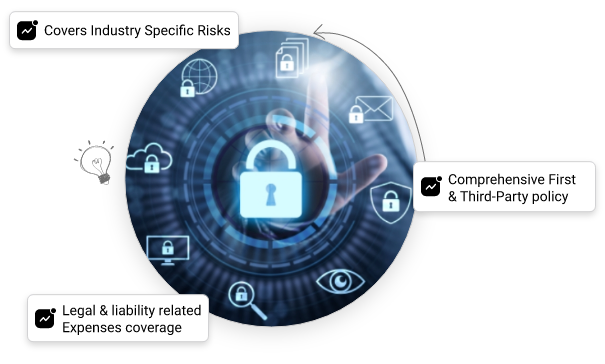Home > Cyber Insurance
Cyber Insurance
A vital tool in your risk management strategy and your shield against digital threats in an era of prevalent cyber-attacks. A cyber insurance policy covers a broad range of risks such as credit card data leaks, data breaches, cyber-attacks, and other digital threats.

What is Cyber Insurance?
Whether it's a data breach where sensitive customer information is exposed, a
ransom is attack that holds your system hostage, or a business email
compromise that tricks your employees into wiring money to criminals, cyber
insurance has you covered.
Also referred to as 'cyber risk insurance' or 'cyber liability insurance', this policy
can help cover the costs of responding, including legal fees, public relations
efforts, and notifying affected customers.It not only covers damages caused by cyber assaults on bank accounts, credit
and debit cards linked to your website, but also unintentional payments made
using digital wallets.
How to Spot a Cyber Attack
1. File or program malfunctions
2. Unauthorized password changes
3. Appearance of unwanted software or spyware
4. Difficulty installing plugins
5. Random file scanning
6. Unusual toolbars on your internet browser
7. Persistent pop-ups while accessing the internet


Who needs Cyber Insurance?
According to a report by Nord locker, small businesses with an employee base of 500
are at the highest risk of ransom are attacks, accounting for around 54 percent of total
attacks between Jan ‘20 to Jul ‘22.
Almost every organization in today's digital age relies on technology in their everyday operations. Customers' names, addresses, and financial information are handled by a wide range of businesses, including IT services, product corporations, e-commerce companies, finance firms, real estate brokers, online marketplaces, restaurants, and many more. All such organizations must carry cyber liability insurance to safeguard themselves against the risk of internet fraud.
Almost every organization in today's digital age relies on technology in their everyday operations. Customers' names, addresses, and financial information are handled by a wide range of businesses, including IT services, product corporations, e-commerce companies, finance firms, real estate brokers, online marketplaces, restaurants, and many more. All such organizations must carry cyber liability insurance to safeguard themselves against the risk of internet fraud.
The top five sectors prone to cyber-attacks in India are:
Information Technology
Manufacturing
Finance
Energy
Consumer services
What happens after a cyber security breach?

Reputation damage
A breach can harm your company's reputation, potentially leading to lost
customers and decreased trust

False wire transfers
If sensitive financial information is compromised, you may face substantial fines
from credit and debit card companies.
Heavy fines
If sensitive financial information is compromised, you may face substantial fines
from credit and debit card companies.
Why get Cyber Insurance?
There are some shocking statistics related to cyber-attacks in India reported by Cisco’s report titled ‘Cyber security for SMBs: Asia Pacific Businesses Prepare for Digital Defense’.
74% of SMEs suffered a cyber-attack in 2021.
62% of those attacked suffered a cost more than 3.5crore.
60% of small enterprises that face a cyber-attack go out of business within six months.
Such statistics push cyber security and insurance to the forefront of every business’s priority.
Mitigating financial losses caused by cyber threats such as data breaches, system intrusions, and ransom are attacks is crucial for corporations to safeguard their operations and reputation. Cyber insurance provides coverage for a range of costs associated with cybercrimes, including investigative charges, data restoration costs, and crisis management fees. By purchasing cyber risk insurance, corporations can ensure continued success in the face of ever-evolving cyber threats.
The Cost of not Having Cyber Fraud Insurance:
Business loss compensation to clients
Ransom fees for restoring stolen data
Cyber forensic investigation costs
Legal attorney
fees
Credit monitoring expenses
Coverages & Exclusions in
Cyber Insurance
Cyber insurance covers a wide range of costs that may occur in a cyber-attack. Here
are some of the key coverages offered by cyber insurance policies
Legal Representation Costs
Provides policyholders with the resources necessary to hire a lawyer to represent their business in court, negotiations with regulators, and to cover the cost of any settlements or judgments.
Malware Attack
A malware attack can cause significant harm to a business's computer systems. In such case this coverage provides the resources necessary to restore the affected systems and defend any legal claims made by victims.
Identity Theft
Provides financial protection in the event of identity theft, and covers the cost of legal representation and settlements, as well as the cost.
Cyber Intrusion Losses
Offers protection against financial losses due to cyber intrusions that result in unauthorized payments to third parties.
Phishing
Protects businesses against the unauthorized access of sensitive information and covers financial losses due to the loss of such information.
Cyber Extortion
Protects businesses that are the victims of an extortion attempt that involves the use of electronic means, such as email or the internet.
Data Breach or Privacy
Provides legal expense coverage in the event of a data breach or invasion of privacy.
Computer Forensics
In the event of a data breach, the policy provides the resources necessary to hire computer forensics experts to identify the breach, control and prevent future damage, and investigate its cause and extent.
Reputational Damage
Offers resources to help mitigate the public relations consequences of a data breach and covers the cost of brand aversion for a set period following the cyber incident.
Fines and Penalties
Protects businesses from the financial penalties and fines imposed by government or regulatory bodies as a result of a cyber incident or data breach.
Extended Reporting Period
If a policy is terminated or not renewed, this coverage provides an extended period for the insured to discover and report any claims by paying an additional premium.
Legal Representation Costs
Provides policyholders with the resources necessary to hire a lawyer to represent their business in court, negotiations with regulators, and to cover the cost of any settlements or judgments.
Malware Attack
A malware attack can cause significant harm to a business's computer systems. In such case this coverage provides the resources necessary to restore the affected systems and defend any legal claims made by victims.
Identity Theft
Provides financial protection in the event of identity theft, and covers the cost of legal representation and settlements, as well as the cost.
Cyber Intrusion Losses
Offers protection against financial losses due to cyber intrusions that result in unauthorized payments to third parties.
Phishing
Protects businesses against the unauthorized access of sensitive information and covers financial losses due to the loss of such information.
Cyber Extortion
Protects businesses that are the victims of an extortion attempt that involves the use of electronic means, such as email or the internet.
Data Breach or Privacy
Provides legal expense coverage in the event of a data breach or invasion of privacy.
Computer Forensics
In the event of a data breach, the policy provides the resources necessary to hire computer forensics experts to identify the breach, control and prevent future damage, and investigate its cause and extent.
Reputational Damage
Offers resources to help mitigate the public relations consequences of a data breach and covers the cost of brand aversion for a set period following the cyber incident.
Fines and Penalties
Protects businesses from the financial penalties and fines imposed by government or regulatory bodies as a result of a cyber incident or data breach.
Extended Reporting Period
If a policy is terminated or not renewed, this coverage provides an extended period for the insured to discover and report any claims by paying an additional premium.
Cyber insurance offers many exclusions. Some of the major exclusions in the insurance
policy are given below
Email Spoofing and Phishing
Some cyber insurance policies may not provide coverage for certain types of social engineering attacks. Instead, these attacks are typically included under commercial crime insurance policies. Examples of such attacks include email spoofing and phishing.
Physical Injury, Disease, Disability, Sickness, or Death
Claims related to physical injury, disease, disability, sickness, or death are not covered under a cyber insurance policy. However, claims related to mental injury or anguish resulting from a breach of data protection law by the company are included.
Incidents/Litigations Prior to Policy Commencement
Claims arising from incidents or acts committed before the policy’s start date, such as cyber talking, IT theft loss, malware damage to computer systems, phishing and email spoofing, cyber extortion, privacy breaches, and data breaches by third parties, are not covered.
Losses or Damages Caused by War or Government Actions
This policy does not cover claims arising from war or warlike scenarios, including invasion, acts of foreign enemies, armed conflict, rebellion, revolution, civil war, government confiscation, or damage to property by authorities.
Dishonest or Improper Conduct
Claims resulting from intentional non-compliance with a ruling, fraudulent acts by the policyholder, or criminal breaches of law or regulation committed by employees, outsourcers, or partners are excluded from coverage.
Contractual Liability
Claims related to contractual and non-contractual incentives offered by the policyholder to customers or clients, such as service rebates, price reductions, credits, promotions, awards, or other incentives, are not covered under this policy.
policy are given below
Email Spoofing and Phishing
Some cyber insurance policies may not provide coverage for certain types of social engineering attacks. Instead, these attacks are typically included under commercial crime insurance policies. Examples of such attacks include email spoofing and phishing.
Physical Injury, Disease, Disability, Sickness, or Death
Claims related to physical injury, disease, disability, sickness, or death are not covered under a cyber insurance policy. However, claims related to mental injury or anguish resulting from a breach of data protection law by the company are included.
Incidents/Litigations Prior to Policy Commencement
Claims arising from incidents or acts committed before the policy’s start date, such as cyber talking, IT theft loss, malware damage to computer systems, phishing and email spoofing, cyber extortion, privacy breaches, and data breaches by third parties, are not covered.
Losses or Damages Caused by War or Government Actions
This policy does not cover claims arising from war or warlike scenarios, including invasion, acts of foreign enemies, armed conflict, rebellion, revolution, civil war, government confiscation, or damage to property by authorities.
Dishonest or Improper Conduct
Claims resulting from intentional non-compliance with a ruling, fraudulent acts by the policyholder, or criminal breaches of law or regulation committed by employees, outsourcers, or partners are excluded from coverage.
Contractual Liability
Claims related to contractual and non-contractual incentives offered by the policyholder to customers or clients, such as service rebates, price reductions, credits, promotions, awards, or other incentives, are not covered under this policy.
About Cyber Insurance
What is the jurisdiction/territory limit of the coverage/claim?
The jurisdiction limit of a claim refers to the countries where the policy will cover
claims filed in the courts. The territorial limit pertains to the location where the
cyber-attack took place.
How much cyber insurance coverage do I need?
The amount of cyber insurance coverage a business requires will depend on its
risk and exposure. Factors to consider include the size of the organization, type
of business, amount of sensitive data, and potential costs of a cyber incident.
Is email spoofing/phishing covered under cyber insurance?
No, email spoofing and phishing are covered under crime/fidelity insurance.
What would be the out-of-pocket cost for a cyber-attack without cyber insurance?
In the event of a cyber-attack, policyholders may face several costs, including
forensic investigation, notification to affected parties, credit monitoring services,
and lost income or business interruption.
Is cyber insurance worth it for small businesses?
Small businesses can still face cyber-attacks and losses but with proper cyber
insurance, they can compensate for these risks. As technology is becoming
increasingly integrated into all types of businesses, even small companies can
safeguard their financial losses from cyber-attacks.
Are cyber insurance premiums tax deductible?
Yes, cyber insurance premiums are tax-deductible as business expenses.
Does cyber insurance cover property damage?
Yes, if a cyber-attack causes damage to a policy holder's physical property, such
as computer systems, the policy may provide coverage for the cost of repairing
or replacing the damaged property.
Is cyber insurance the same as professional liability insurance?
Cyber Insurance helps companies recover from cyber attacks, while professional
liability insurance protects against claims arising from alleged errors, omissions,
or negligence in providing professional services.
What is cyber security?
Cyber security involves protecting a business's assets and employees from
cyber-attacks. To get a cyber security quote, provide a few details about your
company and a team member will contact you to discuss your needs.


